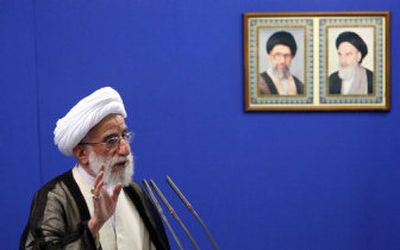The new style of nuclear debate

CAIRO, Egypt – Iran so far has been in the driver’s seat in its confrontation with the West over its nuclear program, gradually leading the Bush Administration to change strategy. Now it faces a choice – to accept the West’s new incentives deal, or go on being confrontational.
For months, Iran has appeared to cleverly manipulate the debate over its nuclear program, engaging in brinksmanship that eventually led Washington to offer talks.
Now, many analysts predict, regardless of whether Iran takes the offer, it probably still holds the upper hand going forward. The Islamic republic has gotten substantially what it wanted – an offer of dialogue with the United States – while still keeping the guts of its nuclear program.
Indeed, the incentive package offered by the United States and other world powers June 1 could prove a key moment: The point where the United States shifted from trying to abort Iran’s nuclear program to merely trying to contain it – much as North Korea’s brinkmanship led the United States to try containment there, too.
These analysts point to a crucial change: The package drops the demands that Iran commit to a long-term moratorium on uranium enrichment, asking instead only for a suspension during talks.
That suggests the United States is willing to accept an Iran that, in a limited way, enriches uranium, the key step toward either running a nuclear power plant or making a nuclear weapon.
That would be significant, because both European negotiators and the United States previously had demanded a halt in enrichment before talks could restart. The United States has accused Iran of wanting a bomb, a charge it denies.
Such a change also would be sure to annoy Western hard-liners, who have pushed for sanctions or even military options against Iran. The son of the toppled shah of Iran, for example, said the new offer will allow Iran’s regime to merely “drag out the game of confusion.”
Indeed, long negotiations are probably to Iran’s benefit, many analysts say, because it can work on its nuclear program, overtly or covertly, while it talks. The new offer only obliges it to suspend things short-term.
Iran has watched with clear interest how North Korea wrung concessions from the West by moving ahead with its nuclear program as a powerful bargaining chip.
Nothing is yet clear, however, because Iran is still studying the offer, and its internal political squabbles could complicate things.
In particular, President Mahmoud Ahmadinejad may worry he could lose domestic political support if Iran agrees to talk and he has to tone down his inflammatory, crowd-pleasing words.
A senior hard-line cleric on Friday criticized the package, while Ahmadinejad has been somewhat warm toward it, knowing that “Iran is in a good position to push the West in the direction it wants,” according to Nasser Hadian, a Tehran University political scientist.
Supreme leader Ayatollah Ali Khamenei hasn’t spoken. He has the final say in all state matters, and has overruled hard-liners previously in the nuclear dispute.
In some ways, there is no downside for Iran in agreeing to talk, said Khalid Al-Rodhan, a visiting fellow at the Center for Strategic and International Studies in Washington who has written extensively on Iran’s nuclear program.
The Iranians could, for example, accept the incentives offer, “suspend” enrichment activities, then resume them once negotiations stalled, gaining diplomatic support from China and Russia for having appeared to be cooperative, he said.
The United States, for its part, disagrees with any notion that it has radically changed its stance or made huge concessions. It says it will push tough sanctions if Iran rejects the deal.
Michael O’Hanlon of the Brookings Institution says it was probably smart of the United States to bend, as a way to persuade Iran’s allies Russia and China that it is trying to solve the impasse.
That will strengthen the U.S. hand if Iran does not cooperate and America again seeks sanctions, O’Hanlon said.
But Al-Rodhan thinks the U.S. change, while in the end both realistic and positive, has also strengthened Iran. It “gives Iran the clout that it forced the U.S. to negotiate directly with it,” he said.